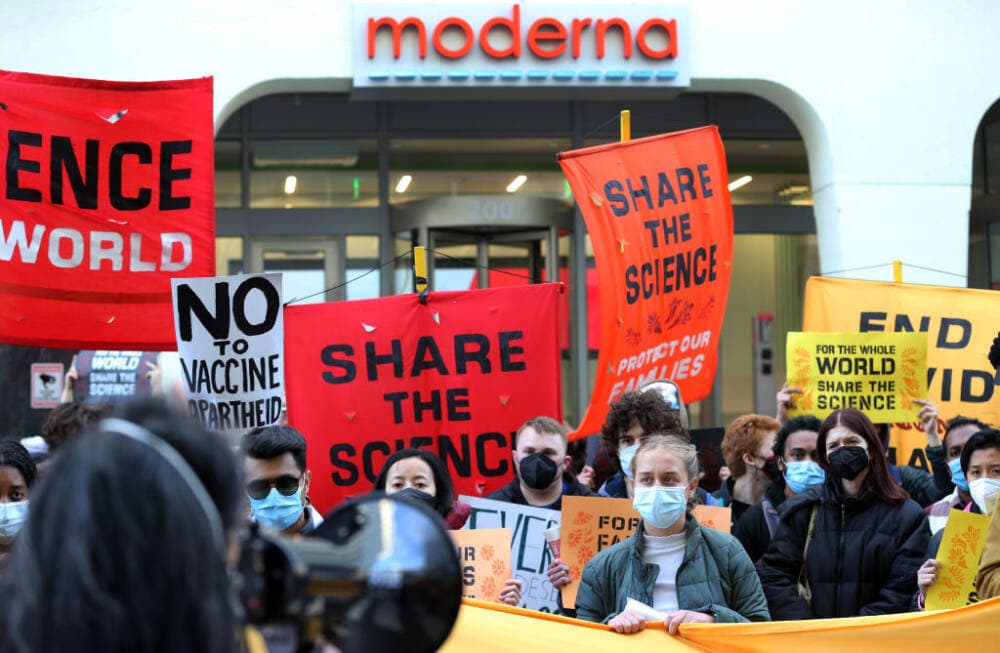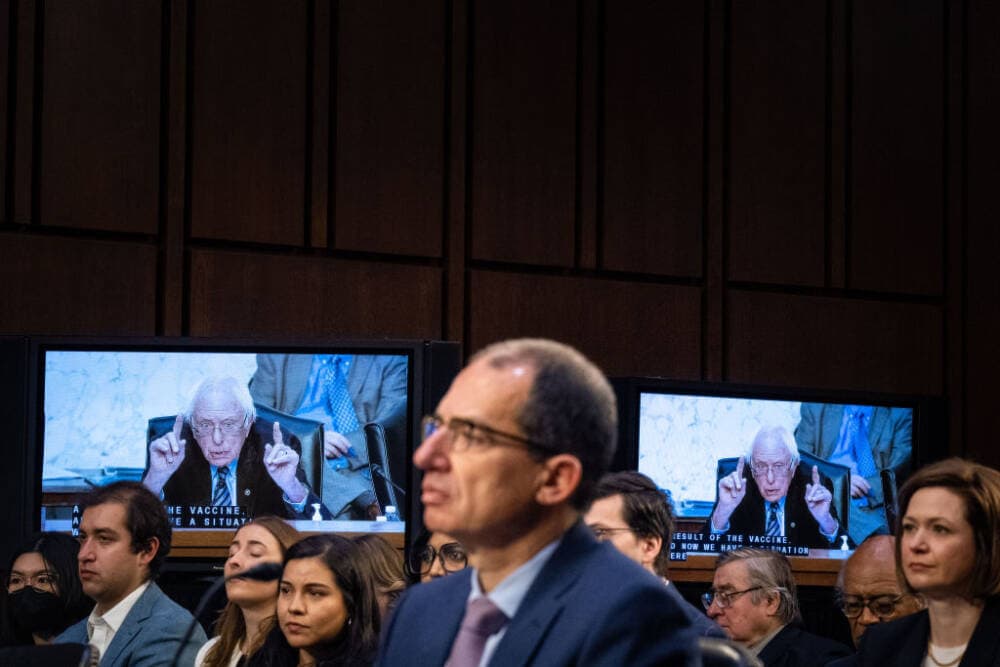Advertisement
Commentary
COVID vaccines were developed on the American people's dime. They’ll soon quadruple in price

For many in the biomedical world, the U.S. Senate’s recent hearing on Moderna’s pricing of the mRNA COVID-19 vaccine was eerily familiar. Moderna (and Pfizer) recently announced that they will raise the price of their vaccines over four-fold to $130 per dose. During the hearing, the CEO of Moderna, based in Cambridge, Massachusetts, was asked to account for the company’s steep price hike.
The chair of the committee, Sen. Bernie Sanders (D-Vt.), emphasized that Moderna, with profits surpassing $20 billion from its COVID-19 vaccine, has made several of its executives "overnight billionaires" during the pandemic. Sen. Bill Cassidy (R-La.), defended industry and the importance of capitalism in innovation, claiming that the hearing sent a hostile signal to future government partners.
It was reminiscent of past congressional hearings about drug pricing, when we heard the usual arguments industry executives lean on when they need to justify their egregious profits for life-saving drugs and treatments. From HIV and hepatitis C therapies to insulin, we have seen this story before.

In reality, physicians like us must care for patients who suffer under the thumb of these pricing practices. The situation is particularly dire for the global poor. Alongside our colleagues in Haiti, Uganda and the Asia Pacific islands, we have cared for patients who die because their families and healthcare systems cannot afford the vaccines, antibiotics, chemotherapy, or other basic medical technologies required to save them.
COVID-19 is just the latest example of global medical apartheid: in sub-Saharan Africa, most countries have yet to vaccinate even half of their population against the virus. Early COVID-19 vaccination campaigns around the world were thwarted by rich countries hoarding vaccines, which limited vaccine supply. Many of the same health systems that are struggling also have limited access to personal protective equipment, diagnostic tests, intensive care units and the health workforce capacity needed to treat severe COVID-19 or other serious illnesses.
These global inequities have long been accepted as an immutable status quo.
As physicians, we are told a specific story about “how medical science advances": The biomedical industry drives innovation by amassing colossal profits to fund research and development activities; products are made available at tremendously high prices in the U.S. and other wealthy countries first, and then (after some heart-wrenching period of time) they supposedly eventually “trickle down” to the rest of the world. But they never fully do.
COVID-19 is just the latest example of global medical apartheid
When we call for this system to change — as we and our colleagues have done for years — we are either wholesale ignored or scolded for potentially suppressing the financial incentives “needed” for biomedical innovation. There have been some hard-fought successes — such as a recent ruling that out-of-pocket costs for insulin in the U.S. will be capped at $35 per month for Medicare patients. However, many argue that this does not go far enough for a medicine whose inventors, 100 years ago, sold the patent for $1 with the understanding that it would be made available to the public. This ruling also does nothing to address the 50% of patients with diabetes globally for whom the medicine is still priced out of reach.
We are now at a critical juncture to expand access to mRNA vaccine technology. The U.S. public funded the development of mRNA vaccine technology by investing more than $30 billion dollars to research, develop and purchase the mRNA vaccines. As part of Operation Warp Speed, the U.S. government purchased vaccine doses even before the clinical trials demonstrated their effectiveness. In essence, all the corporate risk typically involved in biomedical product development was distributed to the U.S. public.
Advertisement
At $130 per dose, the new price would take mRNA vaccines almost entirely off the table for use around the world (health expenditures in Uganda are an average of $33 per person, per year, for example), not to mention create enduring access problems for people in the U.S., including people who are immunocompromised and elderly for whom an annual COVID-19 shot may soon become the best form of protection.
The U.S. public funded the development of mRNA vaccine technology by investing more than $30 billion dollars to research, develop and purchase the mRNA vaccines.
It would seem that Moderna and Pfizer anticipated making this windfall when they manufactured a crisis of global scarcity in the first place. mRNA vaccines were largely unavailable in most of the world at important stages of the pandemic. With a low percentage of the population vaccinated, many parts of the Global South continue to grapple with periodic surges of cases, which threatens the lives of the elderly and immunocompromised, and risks the emergence of new variants.
Despite the fact that public funding bankrolled their products, Moderna and Pfizer declined to share the mRNA technology with the rest of the world and refused to cooperate with approaches to expand access, such as the mRNA COVID-19 vaccine technology transfer hub. The U.S. government allowed it. Meanwhile, the pharmaceutical industry distracted the world with bad faith arguments about protecting shareholder investment and incentivizing innovation, conveniently ignoring the unprecedented public money that underwrote their success.
We need structural changes in our drug pricing system. Most importantly, public investment in biomedical technologies should include provisions to guarantee universal access. Many organizations and academics have put forth feasible policies to make this a reality: such as facilitating global technology transfer, instituting tiered pricing, addressing trade barriers and investing in public manufacturing. The Biden administration endorsed a patent waiver for mRNA COVID-19 vaccine, but it did not go very far in following through on it happening.
The situation is urgent now because Moderna and Pfizer are testing new applications for the mRNA platform to treat other diseases, including other viral infections, cancers and rare diseases. The outlook for expanding the use of mRNA vaccine technology should be very welcome news, but we would be naive to expect that these therapies will be priced accessibly once they are approved for use.
Congressional hearings are a nice gesture, but they are not enough. Pharmaceutical industry executives have become skilled at distracting the public with carefully crafted talking points about product donations and patient assistance programs, which serve as price vouchers for the uninsured and provide the industry a convenient avenue for tax write offs. We know these relatively small tokens do not make a dent in the larger access problem within the U.S. and will do nothing for the global poor.
The fruits of the mRNA vaccine platform, born of publicly funded science, must be made available to researchers, clinicians and patients around the world. This could be an important first step to interrupting the pernicious cycle of global health inequities that have been accepted for far too long.

